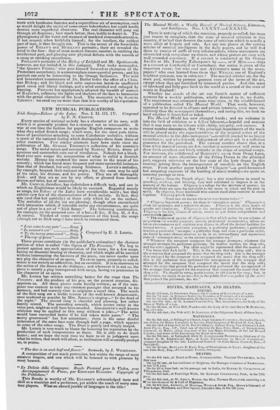The Musical World ; a Weekly Record ey' Musical Science,
Literature, and Intelligence. Nos. CX XXV .—CXXX1X.
There is nothing of which the musician, properly so called, has more just reason to complain, than the state of musical criticism in this country, if indeed that deserve the name of criticism which is usually a mere affair of bargain and sale. Let any one glance at the current articles of musical intelligence in the daily papers, and be will find them to consist of puffs of very inferior artists, whose movements are chronicled with scrupulous exactness, and whose praises are sung with well rewarded constancy. If a concert is conducted at Sir George Swell's or Mr. Timothy Tallowpate's by or if Miss — sings at a concert at Camberwell or Canterbury, due notice is given of the important event ; but who ever saw ATTWOOD'S name in the news- papers ? who ever learned from them that WESLEY, one of England's brightest geniuses, was in existence ? The musical articles are, for the most part, written by persons ignorant even of the terms of the art, except when they are furnished by interested parties. And this mass of falsehood and folly goes forth to the world as a record of the state of music in England ! nether the annuls of the art can furnish matter of sufficient moment for a weekly publication, wholly devoted to it, we doubt. The experiment was attempted some time since, in the establishment of a publication called The Musical World. That work, however, appeared to be devoted to cliques and private interests, even more ex- clusively than the newspapers themselves ; and seeing this, we took no heed whether it flourished or faded.
The Maical World has now changed hands ; and we welcome it into the fie!d of criticism as a fellow labourer,—hopeful and anxious that it may carry on its labours with t,bility, integrity, and success. A recent number announces, that ,$ the principal departments of the WOI k
■ vill be placed under the superintendence of the original writer of the musical articles in the Atlas newspaper."—to which journal he no longer contributes ; and who himself, independent of other aid, is a sufficient guarantee for the periodical. The current number shows that, at a time when musical events are few, incidental occurrences will serve to draw forth excellent and lively remarks in the shape of original essays. For instance, the withdrawal of BARNETT'S opera from Drury Lane, on account of some objections of the Prima Donna to the principal part, suggests strictures on the low state of the lyric drama in this country, arising from the incompetence of vocalists on the English stage. From another paper headed " Cliquery "—a good.humoured but unsparing exposure of the humbug of music.trading—we quote an amusing passage or two.
" Cliquery (from the French clique) has a nice resemblance in sound to quackery, srocke,y, and trickery, very well calculated to impress it on the memory of the learner. Cliquery is a refuge for the destitute of genius; its hospitable doors are open day and night to the mean in talent and the poor in spirit. By &query, those musicians who cannot stand alone contrive to stand together. Cirri:7y giveth fame— 'Those now are known who ne'cr were known before.' " " Cliquey!, begetteth power ; for there is strength in union.' Cliquery is a
cloak for ignorance, and a retreat for shame. Ciiqucry is the alma meter of quacks and charlatans. C/hpary is the nucleus of mediocrity and dulness,.
Cliquey is the holy alliance of music, sworn to put down independence and exterminate genius." " The commonest species of cliquery is that which unites in one scheme of coOperation for worldly purposes, certain professional functionaries, whose re- lative circumstances and • ondition may chance to afford the desired facilities for mutual service. A particular composer, a pAticular performer, a particular teacher, a particular 'arranger,' a particular shop, and even a particular critic, are found by some chance observer to be in an extraordinary and mysterious state of communication,' as the animal magnetizers say." 4, Whatever the composer composes the arranger arranges; whatever the arranger arranges the performer performs, the teacher teaches, the shop sells, and the critic applauds. The affair might be represented after the manner of
The house that Jack built.' This is the music that the shop sold ; this is
the composer that composed the music that the shop sold ; this is the arranger that arranged for the composer thrt composed the music that the shop sold ; this is the performer that performed the arrangement of the arranger that arranged for the composer that composed the mmic that the shop sold ; this is the critic that praised the performer that performed the arrangement of the arranger that arranged for the composer that composed the music that the shop sold. We should be sorry, gentle reader, to add you to the song ; but, in all fairness, we ought to go on— this is the public that was gulled by the critic that praised the performer, isc. 84c."


























 Previous page
Previous page